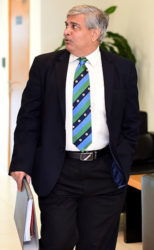Shashank Manohar has resigned from his post as International Cricket Council (ICC) chairman after eight months in office, citing personal reasons.
In a letter addressed to ICC chief executive David Richardson, Manohar said: “I have tried to do my best and have tried to be fair and impartial in deciding matters in the functioning of the Board and in matters related to Member Boards along with the able support of all Directors.
“However, for personal reasons it is not possible for me to hold the august office of ICC Chairman and hence I am tendering my resignation as Chairman with immediate effect. I take this opportunity to thank all the Directors, the Management and staff of ICC for supporting me wholeheartedly. I wish ICC all the very best and hope it achieves greater heights in future.”
Manohar was elected unopposed as the ICC’s first independent chairman – one not affiliated to any of its member boards – in May 2016 for a two-year term, and since then had become the driving force behind the ICC’s retreat from the governance structures created by the Big Three boards of BCCI, CA and ECB in 2014.

In February this year, the ICC had passed in principle a new constitution that undid much of the imbalance in power and finances the BCCI, CA and ECB had sought to create in 2014, but a final decision was to be taken at the ICC Board’s next round of meetings in April. Manohar, however, will now not be the head of the ICC at those meetings and what impact – if any – his absence has on those proposals remains to be seen.
The ICC confirmed receipt of Manohar’s resignation and said: “The ICC Board will assess the situation and next steps before making a further announcement.”
When Manohar replaced N Srinivasan as BCCI president in November 2015, he also became the ICC chairman by virtue of being the head of the Indian board. Later that month, Manohar spoke out against the Big Three revamp of the ICC: “I don’t agree with the three major countries bullying the ICC,” Manohar has said. “That’s my personal view, because as I have always said, an institution is bigger than individuals.”
In his dual role as BCCI president and ICC chairman, Manohar was the person behind the move to have an independent chairman head the ICC, the first step of the rollback that he would try to push through. On May 10, 2016, in the wake of the Lodha Committee’s report that recommended a severe shake up of the administrative structures of the BCCI, Mahohar quit as board president. Two days later, he was elected unopposed as the first independent chairman of the ICC.
The next step for the ICC executive board will be to appoint an interim chairman, before holding elections to find a permanent candidate. They can decide to hold elections by the next round of board meetings in April, or even before that.
According to the ICC constitution: “In the event that the Chairman shall, for any reason, be unable to fulfil or continue to fulfil his duties, then the Executive Board shall appoint an acting Chairman from within the Executive Board to assume such duties until the conclusion of the next Conference at which a new Chairman is elected or, if sooner, upon the existing Chairman being able to fulfil or continue to fulfil his duties.”
All present and past ICC directors were eligible to contest the election at the time of Manohar’s election. Candidates could be nominated by fellow ICC directors, and only one nominee is allowed per director. Any nominee with the support of at least two Full Member directors is eligible to stand for election. (Cricinfo)





